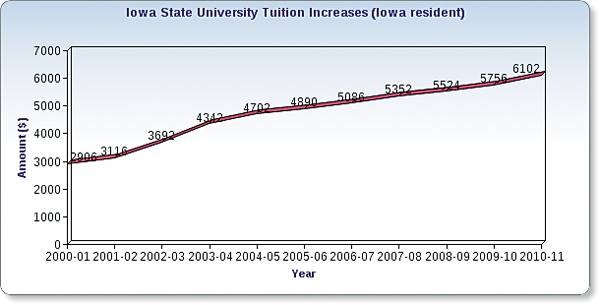Students at ISU take little action when faced with tuition hikes

Students at ISU take little action when faced with tuition hikes
March 10, 2010
College students from both public and private universities across the country took to the streets protesting tuition hikes March 4. In some cases protesters were beaten, hundreds were arrested and riot police were called out in various cities.
Despite a 6 percent tuition increase for the 2010-’11 school year and a 99.7 percent hike for in-state tuition since the 2000-’01 school year, Iowans remained silent. In the fall students will pay $3,052 for a semester of in-state tuition — more than an entire year of tuition in 2001.
Jean-Pierre Taoutel, senior lecturer in world languages and cultures, is surprised no action has been taken in response to the increases.
“I’ve been at Iowa State for 10 years now and I’ve seen so many tuition raises,” Taoutel said. “It seems as though students complain but nothing happens and they end up paying the tuition raise.”
Taoutel often discusses the issue in his classes.
“What I was trying to say in class was if all the students would unite and do like they do in France, where they strike, I’m pretty sure some teachers would go with them,” he said.
The American Association of University Professors sent a letter written by American Association of University Professors General Secretary Gary Rhoades to approximately 400,000 members urging support for the March 4 protests.
“The American Association of University Professors endorses those actions, and encourages our members and their colleagues nationally to make the following weeks and months a time of action and education,” Rhoades said in the letter.
“Our challenge is to reverse patterns of public policy that are further privatizing higher education in terms of who it most serves and benefits, shifting costs to students and families in what amounts to an excise tax on education, and increasingly focusing colleges and universities on serving an ever narrower band of private interests,” Rhoades said.
The letter went on to salute professors in California and students who engaged in protests.
Jason Williams, senior in marketing, said other than some chatter between friends he has not noticed much voicing of opinion on the matter. Williams believes students need to see where the additional money is going.
“If some students see that and feel their money is going to something they don’t think is worth it then they might be more willing to stand up and say something,” Williams said.
Jonny Choate, junior in political science, feels the students are not represented well enough.
“The only development on campus that would have any opportunity to speak for the students would be the GSB and I don’t think they have much influence over the people in power,” Choate said. “They are the link to the people in power and seem to not be valued as much as they should.”
Taoutel is not convinced student leaders have done much concerning tuition.
“You hear all these people and the GSB saying, ‘Yeah, they are going to Des Moines and talk to the legislation leaders and so what? What does it lead to?” Taoutel asked.
GSB President-elect Luke Roling said he plans to lobby the state legislature much more than a few days a year.
“It needs to be year-round, not just once and a while making big pushes,” Roling said.
Roling doesn’t believe students realize the situation they’re in, pointing out Iowa State ranks near the top in student debt. Roling added there is a big disconnect between GSB and the student body.
“I think it’s not necessarily things aren’t happening, I think the dialogue isn’t completely getting sent to students,” Roling said.
“I think the students at Iowa State feel like they have no power over what happens with tuition or other surcharges,” Choate said.
Taoutel poses to his classes the scenario of thousands of students standing on the Campanile declaring they would not go to class because of the tuition raises. He believes nonviolent movements which gain news attention can lead to results such as limiting education cuts.
Prior to teaching in Ames, Taoutel taught in his home country of France where he points to examples of movements overseas. He has come to believe the lack of demonstrations is a difference in cultural ideas.
Indeed, French high school students in Essonne protested the right to wear revealing clothing in December when 300 young people came to school in short mini-skirts and Bermuda shorts. Another 200 students in Gironde took to the streets the same month to protest new rules against holes in jeans, low-slung trousers and piercings.
“If you see a 10 percent raise in fees in France over 10 years you would have huge riots, you’d have demonstrations in the street,” Taoutel said.
“I think if a student organization were to develop to protest or petition about the tuition increase, more students would rally to attempt to put an end to rising tuition costs,” Choate said.
Rolings reflects that opinion and feels there is interest by students to band together on the issue.
Taoutel questions whether the issues have been covered well enough in the Iowa State Daily and other media outlets.
“I think the Daily should raise more issues, they should be more proactive,” Taoutel said.
Williams shares a different sentiment.
“I think the communication is sufficient,” Williams said. “We hear a lot about budget updates in the Daily and other sources such as the Des Moines Register and newscasts — it’s up to us whether we read it.”






